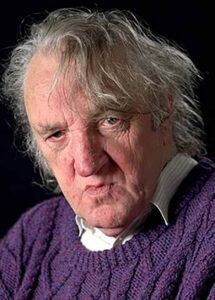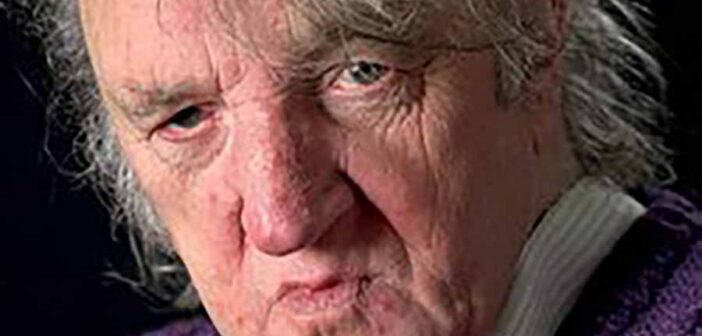
It started, like many Dublin projects (and almost all of them that involved the great man), in Mulligan’s of Poolbeg Street. It was a conversation with the Castlelsland writer Con Houlihan (1925 – 2012) about the great Irish novel. Or rather, we suggested he might write it. He interjected that it had already been done: Knocknagow by Charles Kickham. So we asked him to write a piece about the great novel of Ireland and other countries. This is what he wrote:
There was a time when you couldn’t have a quiet drink in Dublin without meeting somebody who was threatening to write the great Irish novel.
Some people will say that Ulysses was the great Irish novel. DH Lawrence dismissed it as a load of rubbish. It has, however, been a goldmine for scholars from abroad, especially America and Japan, who come here to seek doctorates by analysing perhaps only one chapter. The book, according to the British, is all head and no heart. However, if Joyce wrote nothing but the collection of stories called Dubliners, his fame would be secure.
Tolstoy obviously set out to write the great Russian novel, War and Peace. You would need to take a week off work to read it. It contains some memorable passages but at the end of the week you will wonder was it worth it. Dostoevsky’s Crime and Punishment goes much nearer to what you might call the Russian soul.
Emile Zola wrote several powerful novels but most critics admit that Gustav Flaubert’s Madame Bovary is the best French novel. It tells the story of a country doctor’s wife whose fantasies lead to tragedy.
Nuggets, but you have to work hard to find them.
Is there a great English novel? Charles Dickens was the greatest English novelist if only because he wrote so much. There are many good English novelists since Dickens but not one is outstanding.
Is there a great American novel? John Steinbeck’s The Grapes of Wrath is a candidate. It tells the story of Oklahoma smallholders whose land became useless because the top soil was blown away in a series of storms that created what was called a dustbowl. This led to mass emigration to California which didn’t prove to be a promised land after all. Thomas Wolfe’s Of Time and the River is a great sprawling book. There are nuggets in it but you have to work hard to find them.
Ernest Hemingway wrote For Whom The Bell Tolls. It is set in France and Spain but that shouldn’t preclude it from being the greatest American novel. In fact, it is a load of sentimental nonsense. Dorothy Parker said that it smelled of life. It smells of something. That is for sure.
Many critics now deem F Scott Fitzgerald’s The Great Gatsby as the greatest of American novels, but it sold very badly even at a cut price. And when some magazine published its list of the 100 American best books, it wasn’t included.
Fitzgerald’s early novels sold very well and he became comparatively rich. He and his wife Zelda lived extravagantly, mainly in Paris, but the money ran out. Fitzgerald was hoping that The Great Gatsby would redeem it all but he was forced to seek work in Hollywood.
There, one of the big firms employed him to write streams of dialogue and to suggest plots for films. Some of his work was incorporated in films but his name never appeared in the credits.
While all this was going on, Zelda died in a fire in a mental home. She was a gifted woman who helped Fitzgerald at his work but her big ambition was to be a classical dancer. When she failed, she went into depression. Her death had a profound effect on Fitzgerald. That and the failure of The Great Gatsby, drove him into a long depression and he died prematurely. His unfinished novel, The Last Tycoon, stands as a testament to his genius. His life was truly tragic.
Beautifully planned and beautifully written.
The Great Gatsby touched on many themes. You find out that top professional golfers, even the ladies, aren’t above cheating. And you find out that America’s most prestigious baseball game, The World Series, could be bought, as it was once, by bribing players. Could you imagine the All-Ireland in Hurling or Football being bought . . ?
You learn, too, that the rich can trample on people and walk away hardly conscious of what they have done. It is a great novel, beautifully planned and beautifully written.
Knocknagow: the Great Irish Novel
Let us come back to the great Irish novel. Charles Kickham’s Knocknagow embraces so many topics that it can be called the great Irish novel. Its central theme is the land war.
We learn about Irish class divisions. Matt Donovan, the hero of the book, is a good athlete and an expert on farming but he daren’t even think of his employer’s daughter Mary because she is too far above him. That class consciousness is as strong today as it was in the middle of the 19th century.
We learn, too, that Captain French, Matt’s rival in hammer throwing, is a Protestant and he deems himself as much an Irish man as any. The book tells, too, about the cruelty and senselessness of war: Captain French comes home minus an arm and Jimmy Hogan, the great hurler, comes home minus a leg.
The quiet hero of the book is Billy Heffernan, the famous flute player. He has only a smallholding but it is his, where grass grows and water runs. And he makes the best of it in producing crops that weren’t produced there before.
Knocknagow is a big book but it is easy to read because there is so much drama and a fair dash of humour. It ends optimistically. It is still in print and everybody should read it.




